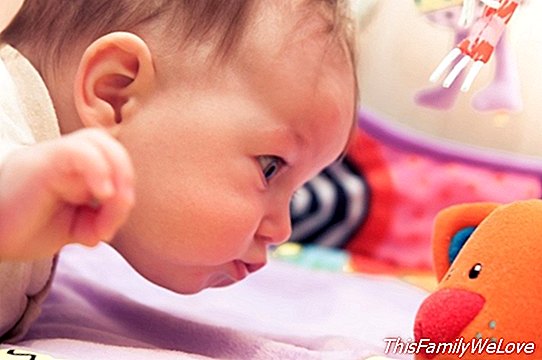The plasticity of babies' brains

Stimulating should not be understood as "accelerating" the pace of developmentor. The stimulation must always be aimed at taking advantage of the child's capacity as a whole. There is a growing awareness that children have unsuspected development potential at birth. And to take advantage of it we must offer them all the opportunities we can to make them manifest.
We, the parents, have to be especially alert to provide them, although we may have to go to a center for a more systematic early stimulation program. If we surround him with love, if we perform exercises with him ... we will get him to acquire many more skills.
The first stages of the baby's brain
We can all learn anything at any time if we put effort and will. However, it is never as easy as in the first stages of life thanks to the plasticity of the brain. In particular, the first stage of childhood is characterized by an important brain growth: new connections and important changes are established in the ramifications and prolongations of the neurons.
Some parents still consider the infant stage as the least important of all. They do not respond to the motivation to learn that their children show, since they may think that there is a lot of knowledge that they will acquire later, when they start Primary. However, it is convenient to highlight the importance of early childhood because there is the basis to ensure the success of future learning and how to prevent possible difficulties.
Stimulation programs for the baby's brain
The stimulation programs were created to be carried out within the family environment and preferably by the parents. However, our culture and way of life make it very difficult that after a working day these can be devoted to developing the materials that most programs require or are willing to carry out in a systematic and daily.
Because at the moment in which any stimulation program starts, it must be continuous, systematic and punctual. It must be borne in mind that any new acquisition that we wish the child to assimilate must have an adequate intensity, frequency and duration, and in relation to what has previously been learned for take advantage of the plasticity of babies' brains.
No limits: boost your baby's chances
The main starting point lies in not placing limits on the possibilities of our son. We can adapt the explanations we give to their ability to assimilate, but ... why focus on purely child issues? Do not restrict your field of action.
We know with certainty that the child learns and discovers little by little the world around him, focusing on very concrete aspects of reality. For example, after visiting a farm they will not be able to describe it objectively and globally as we would. The individual explanations of each child will make us see that among the large number of stimuli received each one has focused on a specific aspect, identifying the animals by small characteristics.
Ana Castán Visa. Coordinator of the Early Childhood Education Cycle of the San Marc School
More information in the book The child's abilities. Regidor, Ricardo. Ed. Word
It may interest you:
- Stimulation for babies from 0 to 12 months
- Visual stimulation exercises for the baby
- Stimulation for babies in the crib
- Exercises to stimulate your baby's ear




